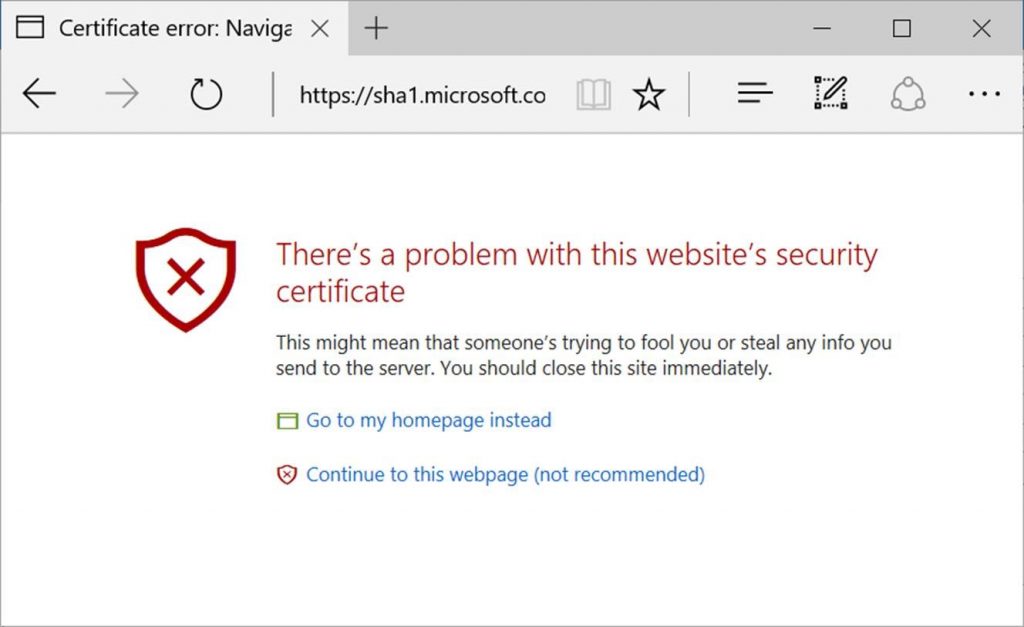A new version of Chrome fixes at least thirty-six security issues in the browser. Aside from listing the vulnerabilities addressed, the release announcement says only that Chrome 55.0.2883.75 “contains a number of fixes and improvements”. You’ll have to read the change log to figure out what else is different. Sadly, the full change log is another one of those browser-killing monstrosities, with almost 10,000 changes listed. Don’t click that link if you have an older computer.
Category Archives: Chrome
SHA-1 deprecation coming soon
SHA-1 (Secure Hash Algorithm 1) is still used by some web sites to encrypt their traffic. Starting in early 2017, most web browsers will start displaying scary-looking warnings when anyone tries to visit sites using SHA-1.
Like this one in Edge:

SHA-1 deprecation announcements
Microsoft
(From a post on the Microsoft Edge blog.)
Starting on February 14th, 2017, Microsoft Edge and Internet Explorer 11 will prevent sites that are protected with a SHA-1 certificate from loading and will display an invalid certificate warning. Though we strongly discourage it, users will have the option to ignore the error and continue to the website.
Mozilla
From a post on the Mozilla security blog.
In early 2017, Firefox will show an overridable “Untrusted Connection” error whenever a SHA-1 certificate is encountered that chains up to a root certificate included in Mozilla’s CA Certificate Program. SHA-1 certificates that chain up to a manually-imported root certificate, as specified by the user, will continue to be supported by default; this will continue allowing certain enterprise root use cases, though we strongly encourage everyone to migrate away from SHA-1 as quickly as possible.
From a post on the Google security blog.
We are planning to remove support for SHA-1 certificates in Chrome 56, which will be released to the stable channel around the end of January 2017. The removal will follow the Chrome release process, moving from Dev to Beta to Stable; there won’t be a date-based change in behaviour.
Chrome 54.0.2840.99
Chrome 54.0.2840.99 fixes about ten bugs, including four related to security. If you use Chrome, make sure it’s up to date: click the ‘three vertical dots’ menu button at the top right, then click Help > About to check. This will also trigger an update if it hasn’t happened already.
The full change log has additional details.
Chrome 54.0.2840.87
According to Google’s announcement, Chrome 54.0.2840.87 fixes at least one security issue. The change log lists forty-seven changes, none of which look particularly interesting or important. Still, this is a security fix, so you should make sure that Chrome has updated itself – if you use it.
Flash 23.0.0.205
Normally Adobe releases Flash updates on Patch Tuesday, but when there’s a critical security vulnerability they will release an ‘out of cycle’ fix. That’s what happened with Flash 23.0.0.205, which was released on October 26 to address a single vulnerability: CVE-2016-7855 (details pending).
Anyone who uses Flash in a web browser should update Flash as soon as possible. If you’re not sure whether you’re running the latest Flash, go to the About Flash page on the Adobe web site.
As always, Internet Explorer and Edge will get updates to their embedded Flash via Windows Update (bulletin MS16-128), and Chrome will update itself automatically. Still, it’s a good idea to make sure by visiting the About Flash page.
Chrome 54.0.2840.71
The full change log lists forty changes in Chrome 54.0.2840.71. None of them seem to be related to security, but at least one is a fix for a crashing issue. The release announcement doesn’t get into any specifics.
Chrome 54.0.2840.59
A new version of Google’s Chrome web browser includes fixes for at least twenty-one security issues.
According to the announcement, Chrome 54 “contains a number of fixes and improvements”, but it doesn’t mention any specifics. If you want to know exactly what’s different, you’ll have to risk crashing your web browser and look at the full change log, which lists at least 10,000 changes.
For most users, Chrome will update itself over the next few days. You can usually trigger an update by running Chrome and navigating to the Help > About page (click the ‘three dots’ icon at the top right).
Opera 40.0.2308.81
A few bug fixes and an update for the Chromium engine comprise the changes in Opera 40.0.2308.81. The Chrome 40 change log lists thirteen total changes, including fixes for some annoying address bar and bookmark issues. There are no security fixes in this release.
Chrome 53.0.2785.143
Three security vulnerabilities are addressed in the latest release of Google’s web browser Chrome. The release notes for Chrome 53.0.2785.143 don’t mention any other changes. The full change log lists over forty changes, but only about twenty of those are actual changes to functionality. All of the changes are minor, although some are fixes for crashing issues.
A few minor fixes for Chrome
Another new version of Chrome was released yesterday. Very little has changed in version 53.0.2785.116. The full change log lists six changes related to actual functionality, and they all seem to be related to appearance and stability. There are no security fixes in this release.
 boot13
boot13